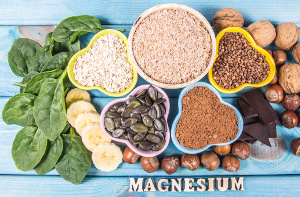In insulin resistance, more magnesium and potassium can shrink fat deposits
 Diabetes and its precursor, metabolic syndrome, are characterized by insulin resistance and overweight. According to a Chinese study that is published in Frontiers in Nutrition, increased intake of magnesium and potassium helps reduce the fat deposits. The authors mention that both nutrients help regulate unstable blood sugar and other metabolic disturbances that are seen with diabetes and metabolic syndrome.
Diabetes and its precursor, metabolic syndrome, are characterized by insulin resistance and overweight. According to a Chinese study that is published in Frontiers in Nutrition, increased intake of magnesium and potassium helps reduce the fat deposits. The authors mention that both nutrients help regulate unstable blood sugar and other metabolic disturbances that are seen with diabetes and metabolic syndrome.
Unhealthy diets, especially those with too many refined carbohydrates, are part of the reason why people develop impaired glucose tolerance and insulin resistance, the condition where cellular uptake of glucose is reduced. As a result of this, excess calories are not metabolized but stored as fat, typically in the abdominal region. Insulin resistance is part of metabolic syndrome and type 2 diabetes, together with symptoms such as elevated levels of cholesterol and triglycerides, hypertension, chronic inflammation, and oxidative stress. The accumulation of body fat seems to be the single largest risk factor in the development of metabolic syndrome and diabetes, both of which increase the risk of cardiovascular complications and early death.
Overweight and diabetes have become a global health problem. It has been known for long that a healthy diet with a properly balanced energy intake plus plenty of protein, wholegrains, and vegetables has a positive impact. Only few studies, however, have looked at how different minerals affect the body’s fat deposits in patients with impaired glucose tolerance, insulin resistance, and metabolic syndrome.
Magnesium and potassium are inversely related to fat percentage
A total of 155 male and female patients with impaired glucose tolerance and insulin resistance took part in the Chinese study. Their average age was 59 years, and their average BMI was 26. A BMI count of 26-30 is considered overweight, while 30 or above is in the obesity category. The participants’ fat percentage, fasting blood sugar, and glucose tolerance were measured. In addition, analyses were made of their dietary intake of eight minerals (calcium, chromium, iron, magnesium, phosphorus, potassium, selenium, and sodium) with help from nutrition analysis software.
The study revealed that participants with impaired glucose tolerance got far too little magnesium and potassium from their diets. Still, those participants who got most magnesium and potassium had a lower fat percentage. The researchers could see this after adjusting for age, gender, macronutrient intake, fiber intake, and physical activity. Based on their observations, they conclude that lack of magnesium and potassium contributes to the development of overweight and metabolic disturbances.
How do magnesium and potassium affect blood sugar and fat metabolism?
We primarily get magnesium from wholegrains, kernels, nuts, and vegetables. Magnesium supports well over 300 different enzyme processes that are important for energy turnover, insulin secretion from the pancreas, and glucose transport across cell membranes. Studies have suggested that magnesium supplementation may have a positive effect on blood sugar levels in patients with metabolic syndrome and an increased risk of developing diabetes. Moreover, magnesium is important for the activation of vitamin D, which is relevant for controlling inflammation and oxidative stress that are seen with metabolic syndrome and diabetes.
Potassium is primarily found in potatoes, dark leafy greens, bananas, apples, almonds, and other nuts. The nutrient is important for the electrolyte balance, fluid balance, muscle and nerve function, heart rhythm, and blood pressure. Potassium also works together with sodium, and it is important to maintain the right balance between the two. People with elevated blood pressure typically need more potassium and less sodium. This is relevant because hypertension is seen both in metabolic syndrome and diabetes.
Potassium is also important for nerve activity and for building muscle mass, which is determining for our metabolism and ability to burn fat.
References:
Natural Chu et al. Higher dietary magnesium and potassium intake are associated with lower body fat in people with impaired glucose tolerance. Frontiers in Nutrition. 2023
Search for more information...
- Created on .








